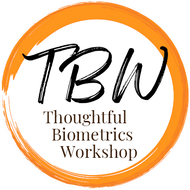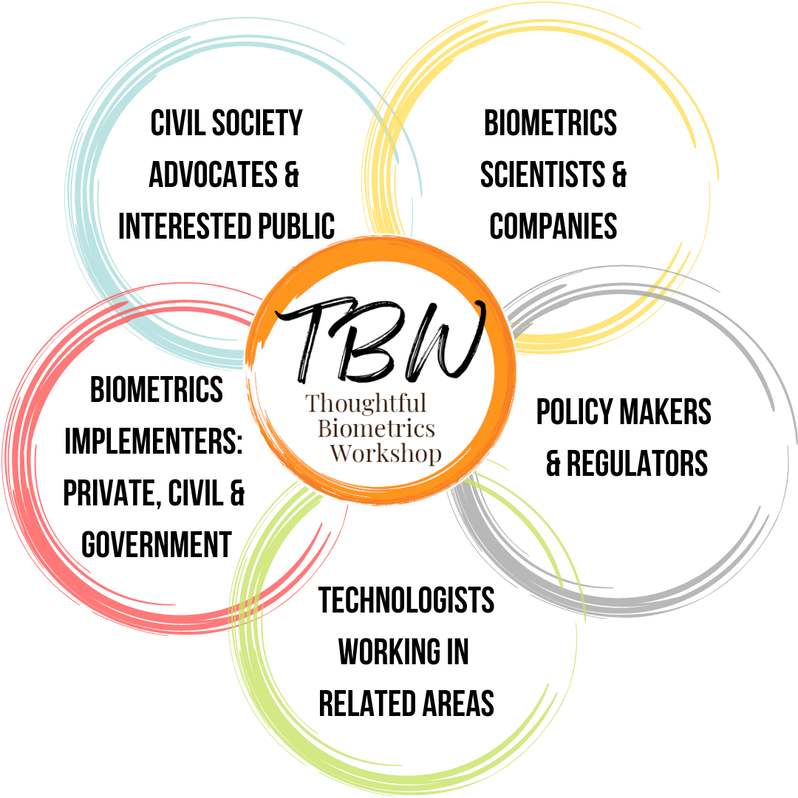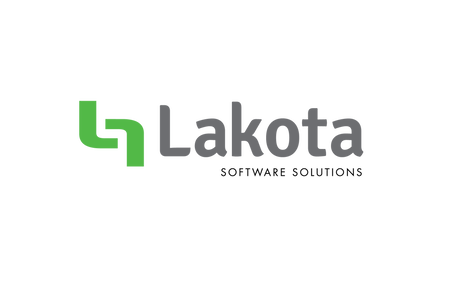- Our goal is to support “uncommon conversations” to deepen understanding between various stakeholders all engaged in work related to biometrics, AI and digital identity to consider the social and policy implications.
- We welcome participants from civil society advocacy groups, scientists and academics that research and innovate biometric technologies, companies that make biometric products, organizations that implement biometric technologies - like the US and Canadian government - as well as NGOs and interested citizens.
- We invite discussion about tangible risks and threat models at all levels, from micro to macro systems. We hope you will join us.
Thoughtful Biometrics Workshop 2023 Book of Proceedings
FORMAT
VIRTUAL - ONE DAY - CO-CREATED BY ATTENDEES
VIRTUAL - ONE DAY - CO-CREATED BY ATTENDEES
- With so many different types of perspectives and knowledge in the room it is ineffective to pre-set an agenda with speakers and panels. We are use a process called open space technology to co-create the agenda live at the start of the event. This format is particularly generative, levels the playing field for the conversations we hope to have, and engages communities with different knowledge bases and perspectives in mutual learning and dialogue.
- You can see a list of potential topics here.
- Curious if it will work? The answer is yes! This format is used at the Internet Identity Workshop, which has convened twice a year since 2005 (including 4 times virtually during 2020-22), and at many other events.
Who participates?
There are many biometrics, ways to capture and measure them, and places in a techno-social system they can be implemented.
The technology landscape is wide and the policy and issue landscape they present is also vast.
This is what we explore at the Thoughtful Biometrics Workshop. We gather humans who care about, are interested in, and are concerned about technology, in order for new perspectives and opportunities to shape future policy to emerge.
These are the stakeholder groups participating in Thoughtful Biometrics Workshop and why:
Civil Society Advocates and the Interested Public
New technologies have many implications. The public is naturally concerned about Biometric Technologies, while Civil Society Advocacy organizations are tracking the development of these technologies and raising concerns about their usage in various contexts.
TBW provides an opportunity to share concerns and ask deep questions of the people who make and implement the technologies, to understand more about how they work in practice. There is also opportunity to share research and studies that have been done highlighting the flaws and misuses of biometric technology with creators, implementers and policy makers.
Biometric Research Scientists & Companies that make Biometrics Products
Companies use the work of biometric scientists to make products. Many technologies are combined to make products that apply to different use-cases. TBW provides an opportunity to share details of how various biometric modalities work (capture and comparison mechanisms) in practice, and to dispel misconceptions. There is also opportunity to share how technologies are combined to make products and how these work with other systems.
Policy Makers and Regulators
Biometrics are diffusing and being adopted in a variety of settings across many domains: employment, government, commercial and civil society. Some of these uses are aligned with existing policy requirements, some are novel uses that are not yet regulated at all.
TBW provides an opportunity to understand the concerns that civil society advocates and the public have about existing and future uses that require reasonable regulation. The event is also an opportunity to learn in more detail from experts in biometrics and understand how the technology works in practice.
Biometrics Implementers in the Private Sector, Government, Civil Society
These are organizations who buy biometrics technology solutions from companies to use in their day-to-day operations. They apply the technology either for authentication (checking someone matches an enrolled identity) or for identification. TBW provides an opportunity to share how and why they use biometric products to solve operational needs and explain more about their reasoning.
The event is also an opportunity to learn more details of how the technology works from the researchers, and to hear more about concerns regarding misuse and overuse.
Technologists Working in Related Areas
There are a range of neighboring technologies and systems often used in conjunction with Biometrics, including identity and access management. TBW provides an opportunity to learn from a range of stakeholders involved in biometrics technology, and to share perspectives about how neighboring technologies interact with biometrics.
The technology landscape is wide and the policy and issue landscape they present is also vast.
This is what we explore at the Thoughtful Biometrics Workshop. We gather humans who care about, are interested in, and are concerned about technology, in order for new perspectives and opportunities to shape future policy to emerge.
These are the stakeholder groups participating in Thoughtful Biometrics Workshop and why:
Civil Society Advocates and the Interested Public
New technologies have many implications. The public is naturally concerned about Biometric Technologies, while Civil Society Advocacy organizations are tracking the development of these technologies and raising concerns about their usage in various contexts.
TBW provides an opportunity to share concerns and ask deep questions of the people who make and implement the technologies, to understand more about how they work in practice. There is also opportunity to share research and studies that have been done highlighting the flaws and misuses of biometric technology with creators, implementers and policy makers.
Biometric Research Scientists & Companies that make Biometrics Products
Companies use the work of biometric scientists to make products. Many technologies are combined to make products that apply to different use-cases. TBW provides an opportunity to share details of how various biometric modalities work (capture and comparison mechanisms) in practice, and to dispel misconceptions. There is also opportunity to share how technologies are combined to make products and how these work with other systems.
Policy Makers and Regulators
Biometrics are diffusing and being adopted in a variety of settings across many domains: employment, government, commercial and civil society. Some of these uses are aligned with existing policy requirements, some are novel uses that are not yet regulated at all.
TBW provides an opportunity to understand the concerns that civil society advocates and the public have about existing and future uses that require reasonable regulation. The event is also an opportunity to learn in more detail from experts in biometrics and understand how the technology works in practice.
Biometrics Implementers in the Private Sector, Government, Civil Society
These are organizations who buy biometrics technology solutions from companies to use in their day-to-day operations. They apply the technology either for authentication (checking someone matches an enrolled identity) or for identification. TBW provides an opportunity to share how and why they use biometric products to solve operational needs and explain more about their reasoning.
The event is also an opportunity to learn more details of how the technology works from the researchers, and to hear more about concerns regarding misuse and overuse.
Technologists Working in Related Areas
There are a range of neighboring technologies and systems often used in conjunction with Biometrics, including identity and access management. TBW provides an opportunity to learn from a range of stakeholders involved in biometrics technology, and to share perspectives about how neighboring technologies interact with biometrics.
TBW2 SPONSORS
TBW2 MEDIA PARTNER
Participate in Workshop conversations, take action in ongoing work on biometrics & AI issues.
Thoughtful Biometrics Workshop is a project under the umbrella of Planetwork NGO, fiscally sponsoring projects at the intersection of society, the planet and technology for twenty years.







